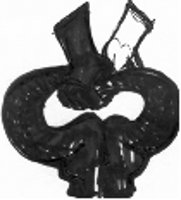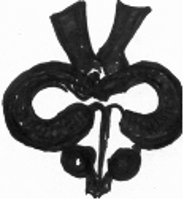November, 2010

Asi deka melea todzo o. (Ewe)
Mkono moja huwezi kushika nyati. (Swahili)
Une seule main ne peut pas attraper un buffle. (French)
One hand does not catch a buffalo. (English)
Background, Explanation, Meaning and Everyday Use
This proverb in the Ewe language is spoken in Southeast Ghana, Southern Togo, Benin and Southwest Nigeria. Its literal meaning is that there is no strength in isolated efforts. But collective efforts yield great things. Among the Ewe people, and indeed among most human societies and communities, there are some activities that are expected to be carried out by many people to achieve good results such as the building of schools, churches, roads and tree planting, etc. So anybody who is trying to carry out a community type of project by himself or herself is usually reminded about the community nature of the work by hearing this proverb. Other Ewe proverbs are Ati deka me woa ave o (One tree does not make a forest) and Ati deka metua xo o (One tree or pole does not make a building).
It is common in many other languages in variant forms of imagery. For example, among the Kikuyu in Kenya they say One finger does not kill a louse. It’s absolutely necessary to use at least two thumbs to kill lice. In this regard any attempt to act alone in situations that demand collective efforts is seen as a selfish effort in futility.
The symbolic interpretation of the proverb suggests the opposite of isolation to mean there is strength in unity. Among many people and particularly those who hunt, the buffalo is one of the most feared animals in the bush. It is feared more than the lion and the elephant. It is very strong, very fast and usually moves in large herds. If a wounded or even a frightened buffalo is determined to kill you there is very little you can do to frighten it away from you. If for any reason that you need to confront a buffalo, you cannot do it casually by using one hand. You must use all your strength. This is why it is used as the imagery to show the dynamism of the magnitude of community projects that should not be done by individuals.
Biblical Parallels
Ecclesiastes 4: 9-12: “Two are better than one.”
Ephesians 4: 3: “Make every effort to keep the unity.”
Contemporary Use and Religious Application
This proverb emphasizes the importance of unity, solidarity and community values. For example, the collective effort of environmental  protection and rejuvenation of depleted areas such as the Mao Forest in Kenya. Asi deka melea todzo o is therefore an appeal to all concerned about the environment to pull together to tackle the enormous job symbolically expressed in facing the strength of the buffalo.
protection and rejuvenation of depleted areas such as the Mao Forest in Kenya. Asi deka melea todzo o is therefore an appeal to all concerned about the environment to pull together to tackle the enormous job symbolically expressed in facing the strength of the buffalo.
This Ewe proverb can be used in promoting Small Christian Communities (SCCs) as a new way of being church.
NOTE: This proverb is No. 24 in the booklet Collection of 100 Ewe Proverbs. A Collection and Interpretation of Ewe Proverbs in Ewe and English with illustrations by Cephas Agbemenu. Nairobi: Privately Printed, November, 2010. This is one booklet in the series of Endangered African Proverbs Collections. It is posted as an Ebook on our website at: http://afriprov.org/index.php/resources/e-books.html
Professor Cephas Yao Agbemenu
Department of Fine Arts
Kenyatta University
P.O. Box 43844
Nairobi, Kenya
Cellphone: 254-723-307-992
Email: cyagbemenu@yahoo.com

